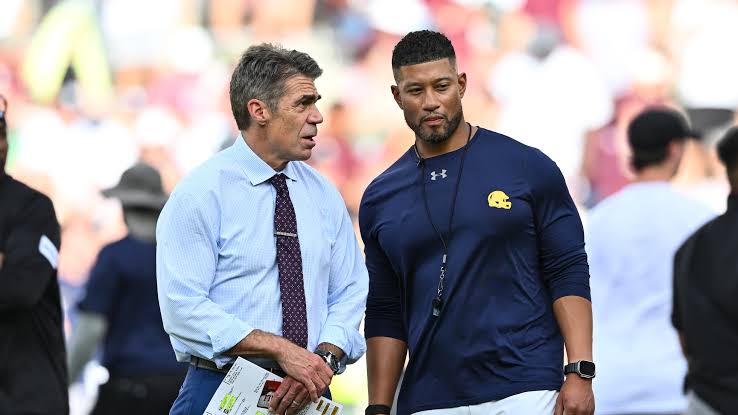In a stunning development that has sent shockwaves through the college football landscape, Marcus Freeman, the esteemed head coach of the Notre Dame Fighting Irish, has officially announced his departure to lead the Michigan Wolverines football program. This unexpected move comes on the heels of Freeman’s recent contract extension with Notre Dame, underscoring the magnitude of his decision.

Freeman’s Tenure at Notre Dame
Marcus Freeman, 38, was appointed as Notre Dame’s head coach in December 2021, following Brian Kelly’s departure to LSU. Over his three-season tenure, Freeman amassed a commendable 30-9 record, with an impressive 11-4 mark against top-25 opponents. His leadership not only revitalized the team’s on-field performance but also strengthened bonds with student-athletes, fostering a culture of unity and resilience.
Under Freeman’s guidance, Notre Dame secured a spot in the College Football Playoff (CFP) for the first time under his leadership, reflecting the program’s upward trajectory. His commitment to excellence was further solidified in December 2024, when Notre Dame announced a four-year contract extension, aiming to keep him at the helm through the 2030 season.

The Unexpected Shift to Michigan
Despite the extension and public affirmations of his dedication to Notre Dame, Freeman’s decision to transition to Michigan has raised eyebrows. Sources indicate that Michigan presented Freeman with an enticing offer, including a substantial increase in resources for coaching staff and player development, aligning with his vision for a championship-caliber program.
Michigan’s pursuit of Freeman underscores their ambition to reclaim prominence in college football. The Wolverines have faced challenges in recent seasons, and Freeman’s proven track record positions him as the ideal candidate to steer the program back to national contention.
Notre Dame’s Response and Future Prospects
Notre Dame’s Director of Athletics, Pete Bevacqua, who played a pivotal role in Freeman’s contract extension, expressed surprise and disappointment at the announcement. Bevacqua had previously lauded Freeman’s contributions, stating, “He’s our coach. I want him and Notre Dame wants him to be our coach for the foreseeable future.” citeturn0search1
The abrupt departure necessitates a swift and strategic response from Notre Dame’s administration. The immediate focus will be on identifying a successor who can maintain the program’s momentum and uphold the standards set during Freeman’s tenure. Potential candidates may include internal staff members familiar with the team’s dynamics or external figures with a history of success in collegiate football.
Implications for Michigan and the Broader College Football Landscape
For Michigan, securing Freeman’s leadership signifies a bold statement of intent. His defensive acumen, recruiting prowess, and ability to cultivate strong team cultures are expected to invigorate the Wolverines. Freeman’s move also adds a new chapter to the storied Notre Dame-Michigan rivalry, with future matchups likely to carry additional intrigue.
This transition also reflects the evolving nature of coaching careers in college football, where opportunities and challenges can lead to unexpected shifts. Freeman’s move serves as a reminder of the dynamic environment within which collegiate athletics operate, influencing recruitment, program strategies, and conference dynamics.
Conclusion
Marcus Freeman’s decision to leave Notre Dame for Michigan marks a significant juncture in college football. As both programs navigate this transition, the upcoming seasons will reveal the impact of this move on their respective trajectories. Fans and analysts alike will be keenly observing how Freeman’s leadership influences Michigan’s fortunes and how Notre Dame adapts to this unforeseen change.
